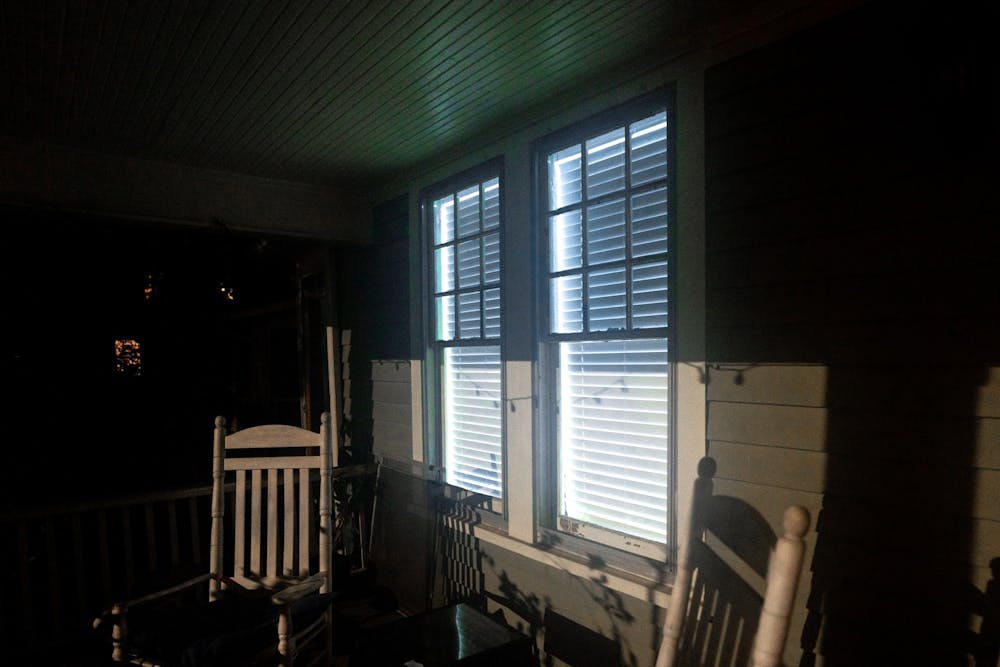No one should have to feel unsafe in their home, and it should be a landlord's responsibility to provide the basic safety of their tenants or put them in contact with someone who has the capacity to help.
Hannah, a junior at UNC, was one of four women living in a house in Chapel Hill. Her landlord lived next door, which she said inspired confidence and made them feel that he would be more involved in ensuring their safety.
On many occasions, Hannah and her roommates answered knocks on their door from individuals asking for money and rides. Oftentimes, these instances would occur at night.
“We kept reporting them to our landlord and he just never seemed to care and never seemed to do anything about it,” Hannah said.
She also described an instance when she was walking home alone at night and was chased by someone through the neighborhood. When she told her landlord, he seemed apathetic and didn’t offer any ways to mediate her safety concerns.
“I definitely think our age and the fact that we're women had something to do with it,” Hannah said. “He had other tenants and we weren't really close with them, but everyone in the neighborhood watched out for each other. We spoke to other people, and no one seemed to have the same issue that we were having, especially safety-wise, but I think that [safety] should be a priority for male landlords when they know that they have young women living in their houses.”
Privacy
When meeting with their landlord for the first time, Lee and their roommates expressed to him that privacy was the most important thing.
“We said that it was really important to us that he told us when he was going to be coming over, because we are three young women or women-adjacent people and it's not appropriate for my 50-year-old male landlord to be over unannounced,” Lee, a sophomore, said.
Although he agreed, Lee’s landlord entered their home unannounced on multiple occasions. They noted times when their landlord would unlock the door and come into their house without knocking or giving notice. He did not allow for curtains, despite the home's large windows. Lee even found him walking around the property with the ability to see through the windows.
“I think whenever you're living anywhere, you have the right to privacy,” Lee said.
After doing thorough research into North Carolina tenant laws, they have found no valid ways to hold their landlord accountable despite these clear violations of safety and privacy.
To get the day's news and headlines in your inbox each morning, sign up for our email newsletters.
Respect
Women are too often disrespected and belittled by their male landlords. Our conceptions about women’s roles and capabilities in the home have led to demoralizing and stigmatizing experiences for young women within their housing situations.
This includes assuming female tenants are incapable of certain home upkeep or patronizing them when they express concern regarding issues in the home. Both Lee and Talia, a full-time UNC employee in pursuit of her bachelor's degree, have experienced these issues with their landlords.
Talia faced many maintenance issues with her previous residence and was repeatedly dismissed by her landlord.
“We had a smoke alarm that just didn't work and when I tried to tell him, he told me on multiple occasions just to change the battery,” Talia said.
She also had a serious roach infestation in her previous residence, and after repeatedly expressing concern and finally documenting the infestation, was barred from resigning her lease at the end of the leasing period.
“I was essentially evicted for trying to hold him accountable and not allowing him to walk all over me,” Talia said.
Although Lee is non-binary, they still experience the same categorizations as female-presenting individuals. They face the same consequences of harmful gender roles, making it essential that our understanding of the situation is intersectional and accounts for the highly pervasive nature of sexism within domesticity.
“[Our landlord] treats us as if we are incapable of living in this place and incapable of doing the things that he would do if he was here, even though I frankly think that he and I are capable of the exact same kind of maintenance, the exact same kind of skill set,” Lee said.
The legal framework does little to protect the dignity and well-being of vulnerable individuals in leases.
The Fair Housing Act is a federal law that protects tenants against discrimination. It includes a list of “protected classes”– people who all share a particular trait — with "sex” being added as one of those protected classes in 1974. This means tenants across the country can’t be treated differently based on gender, including a ban on sexual harassment.
Little can be done, however, to prevent the everyday interactions that result in the stigmatizing, belittling and disempowerment of female and female-presenting renters, as they are informal breaches in a longstanding culture of inequity.
Universally, there is no one set of renter’s rights, and laws vary by state.
While there’s work to be done to protect yourself when entering a lease agreement – educating yourself on your state’s tenant rights, documenting living conditions and keeping all paperwork and correspondence – more is needed to protect systemic issues faced by vulnerable populations.
Gender roles are a relevant culprit in this story, but it is just as necessary to acknowledge the lack of protection tenants are granted in renters' rights. There is much work to do on this front to make sure young women and non-binary renters — and all renters — are afforded proper safety, privacy and respect.
@sophhteague
opinion@dailytarheel.com



